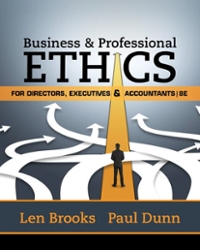On April 14, 2010, Russian investigators raided the Moscow offices of Hewlett Packard (HP). They did so
Question:
On April 14, 2010, Russian investigators raided the Moscow offices of Hewlett Packard (HP). They did so at the request of German prosecutors who were examining whether HP had paid bribes totaling
\($10.9\) million (€8 million) in bribes to win a \($44.5\) million (€35 million) contract to supply computer hardware and IT systems to the Chief Public Prosecutor’s Office of the Russian Federation—the very office responsible for prosecuting bribery cases in Russia.
In December 2009, HP received search warrants that outlined allegations against ten people for bribery in regard to a contract signed on August 1, 2003, for hardware, systems, and advice provided from 2001 to 2006. Also in December, German authorities arrested “three suspects, including one current H-P executive and two former company officials.… None of the three [was] formally charged and all [were] released on bail.”1 Among the allegations was that bribery payments were flowed through accounts in various countries throughout Europe. German and Swiss authorities subsequently received assistance to trace transfers through the United Kingdom, the United States, the British Virgin Islands, and New Zealand as well.
Under German law, HP cannot be charged
(only individuals can), but illicit profits made as a result if a bribe can be seized by a court although subsequent prosecutions could follow from the United States through its Foreign Corrupt Practices Act as well as other countries.
Interestingly, according to HP, none of the ten individuals were still employed by HP in 2010, and the signature of the Russian official on the contract was illegible. The HP official who signed the contract has so far remained silent on the matter.
HP did not initially report the allegations on their SEC filings and subsequently, in their March 11, 2010, filing, referred only indirectly to them saying that “in many foreign countries illegal practices are ‘common’” and “in violation of our policies … could have a material adverse effect on our business and reputation.”2 In September 2010, HP announced that the investigation had been widened to additional transactions and that the U.S. Department of Justice and the SEC have been probing the Russia deal and possible violations of the Foreign Corrupt Practices Act. HP’s share price declined 1.5% to \($38.22\) at that time.3
Questions:-
1. Why would HP personnel think they could get away with bribing an employee in the Russian antibribery prosecutor’s office?
2. Why was it done through a series of companies in different countries?
3. What has changed to now allow investigators to unravel such a series of events, whereas in the past they would have found it almost impossible?
4. If a company decides to bribe, how many years need to go by so that they are safe from prosecution?
5. Even though German law does not allow companies to be charged, what are the possible consequences of the alleged bribery for HP?
Step by Step Answer:

Business And Professional Ethics
ISBN: 9781337514460
8th Edition
Authors: Leonard J Brooks, Paul Dunn





